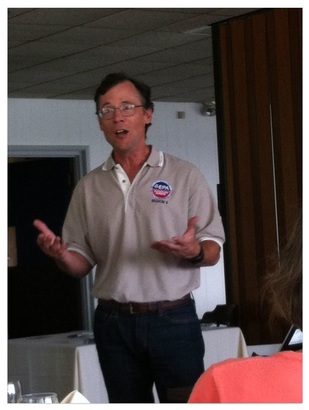 Tim Drexler of the US EPA Tim Drexler of the US EPA On July 7, the Waukegan Harbor Citizens Advisory Group hosted the Lake Michigan League of Women Voters for an informative and interesting lunch at the Waukegan Yacht Club followed by a cruise in the harbor aboard the educational research vessel, W.G. Jackson. USEPA Superfund Project Manager Ted Drexler addressed our group over lunch, and Waukegan Harbor Citizen Action Group President Susie Schreiber assisted the boat crew in identifying important aspects of the cruise. We were eager to see the results of millions of dollars of spending in public money to clean up industrial waste, and also to enjoy the beautiful but windy day on the lake. In this we were not disappointed as about 35 attendees from Winthrop Harbor to Evanston asked questions and made investigations with the help of the crew. We had three elected officials in our midst, as well as some students. In 1981, prompted by the discovery of high levels of polychlorinated biphenyls (PCBs) in harbor sediments, Waukegan Harbor was named as one of 43 Areas of Concern (AOC) on the Great Lakes by the International Joint Commission, U.S. EPA and IllinoisEPA. The harbor was identified as an AOC using protocols developed by the United States and Canada under the Great Lakes Water Quality Agreement of 1987. The Waukegan Harbor Citizens Advisory Group (CAG) was formed by the Illinois EPA in 1990 to assume a leadership role in developing a remedial action plan (RAP) for the Waukegan Harbor AOC. The harbor at one time had the largest known concentrations of PCBs and PCB-contaminated sediments, left from previous industrial uses of the site, including the Outboard Marine Corporation. In addition to lessening contamination in the harbor, the CAG also worked with state and local government officials to deal with the open dumping of litter, garbage and tires, and has worked to identify older commercial properties that are candidates for redevelopment. The CAG has received a Great Lakes Restoration Initiative (GLRI) Grant to restore portions of the Glen Flora Ravine and the coastal habitat located south of Illinois Beach State Park to the City of Waukegan public beach. The League of Women Voters Lake Michigan Region has lobbied hard for the continued funding of the GLRI since it was first introduced in 2010. We believe that investment in the Great Lakes should be a national priority, as they hold 84% of America’s surface fresh water, with only 1% being “new” water each year as what we have is left from the Glaciers passage 10,000-14,000 years ago. For Further information: http://epa.gov/greatlakes/aoc/waukegan/index.html http://www.epa.gov/region5/cleanup/outboardmarine/index.htm  Yes, you have unwanted/unneeded/expired drugs. Keep them out of our waters! Yes, you have unwanted/unneeded/expired drugs. Keep them out of our waters! If you are like us, April means its Drug Take Back time, and you are in the habit of going through your prescription and over-the-counter drug containers to weed out the expired and unneeded drugs. That is still a good idea, but this year you may have to rethink where you will bring the drugs for safe disposal so they stay out of our freshwater sources. After organizing highly successful National Drug Take Back Days in April and October of the last four years, the Drug Enforcement Agency (DEA) has discontinued the program. Ongoing local collection sites are now available thanks to the Secure and Responsible Drug Disposal Act of 2010. To find a drug collection site near you, search the DEA's database, or find a site run by Yellow Jug Old Drugs®, a collection program operated by the Great Lakes Clean Water Organization in Wisconsin, Illinois, Indiana, Michigan and Ohio. 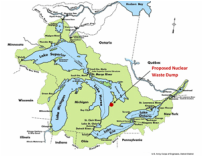 Location of proposed Ontario Power Generation nuclear waste repository near Lake Huron. (Image credit: cleanwateraction.org) Location of proposed Ontario Power Generation nuclear waste repository near Lake Huron. (Image credit: cleanwateraction.org) LWVLMR thanks and salutes the Leagues of Women Voters of Downers Grove/Woodridge/Lisle, Elmhurst, Glen Ellyn, Naperville, Roselle/ Bloomingdale, and Wheaton, for taking action on a matter to safeguard the Great Lakes. In February, these Leagues jointly testified in favor of a proposed DuPage County, IL resolution which opposed development of a deep geological repository for low and medium level nuclear waste in Canada. The proposed site is about 1 km (that's about .6 miles) from the shores of Lake Huron. Opposition to the proposed waste site is coming from all levels here in the Great Lakes region. Numerous communities throughout the Great Lakes Basin - on both sides of the border - have also passed resolutions. Today, League members join other advocates on Capitol Hill to share the need for continued restoration of the Great Lakes. They will be discussing clean water protection, runoff pollution, and invasive species, and funding of programs like the Great Lakes Restoration Initiative, the Regional Conservation Partnership Program, and the Clean Water State Revolving Fund, all of which are critical to the health of the lakes.
LWVLMR is a member of the Healing Our Waters - Great Lakes Coalition, which organizes Great Lakes Day every year. On January 4, League members from Indiana, Illinois, and Wisconsin gathered in Madison to get a jump on water advocacy work in the new year.
Exciting news was shared: local Leagues in several states bordering the Mississippi River are interested in following the LWV Lake Michigan Region model, and exploring how they can collaborate on Upper Mississippi River Watershed issues. We look forward to increased League focus on water policy issues, and stand ready to assist the fledgling group in any way we can! 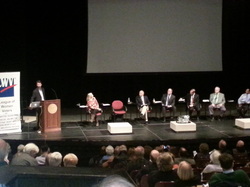 David Rankin of the Great Lakes Protection Fund was the first of the six speakers. David Rankin of the Great Lakes Protection Fund was the first of the six speakers. The Village of Winnetka, IL is in the midst of developing plans to construct a conveyance tunnel for excess stormwater to Lake Michigan. Yesterday, the LWVLMR joined the Leagues of Women Voters of Evanston, Glencoe, Glenview, Wilmette, and Winnetka-Northfield-Kenilworth to cosponsor a program, "Managing Stormwater/Protecting Lake Michigan: Determining the Future Now," to provide information and context to the public. A distinguished panel of speakers provided background on Lake Michigan; Green Infrastructure; stormwater planning in Glenview, IL; the specific plans in Winnetka; and the stormwater discharge permitting process in Illinois. Beth Coulson, a member of the LWV Glenview, moderated. The speakers have kindly given us permission to share their powerpoint presentations. For more information on the tunnel, please see the Village of Winnetka's dedicated stormwater management planning website. For media coverage of this program, see articles in the Chicago Tribune, and the Glenview Announcements (also appeared in other Pioneer Press publications). UPDATED 10/30/14 to add newspaper article. SECOND UPDATE on 11/9/14 to link to speaker presentations. 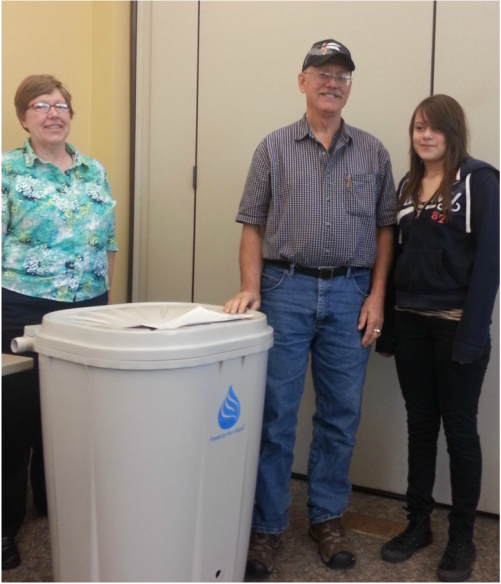 Zion resident Tim Glover and his granddaughter, Elena Aparicio, take the prize at the Zion-Benton Public Library from Rosemary Heileman, Lake County Coordinator for the Stormwater Project. Zion resident Tim Glover and his granddaughter, Elena Aparicio, take the prize at the Zion-Benton Public Library from Rosemary Heileman, Lake County Coordinator for the Stormwater Project. Tim Glover of Zion, IL, was the lucky winner of a new rain barrel, when he attended the "Stormwater from the Ground Up" presentation on Saturday, September 21, 2014. The program at the Zion-Benton Public Library was sponsored by the League of Women Voters of Lake County. Thanks to a generous donation from a League member, we have been able to add seven to the number of rain barrels out there. In regard to providing the raffle prizes, the member said, "How powerful is it to actually offer a rain barrel to an audience that you have been suggesting use them?" The 7th and final drawing will take place on Monday, September 29, 7 pm, at the LWV Wilmette-sponsored program at the Wilmette Community Recreation Center. Thanks for coming and congratulations, Tim! 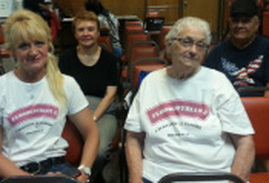 On their shirts: "Floodlothian 5: I survived 15 floods." On their shirts: "Floodlothian 5: I survived 15 floods." Residents from Midlothian, Illinois attended the June 16 presentation of the Stormwater from the Ground Up program at the Dolton Public Library. They shared their neighborhood's flooding problems and their attempts to get help. At nearly every place we bring the program, League members meet people whose homes suffer from chronic flooding. While we appreciate their thanks for some new ideas about how to address their problems, it is clear that people are overwhelmed. Additional governmental efforts to assist individuals is needed. 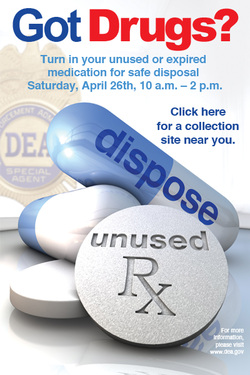 We now know that unsafe methods of disposing of unused medicines— like flushing the drugs down the toilet or throwing them in the trash--may lead to drugs entering our freshwater supplies. On April 26 from 10 a.m. to 2 p.m., the Drug Enforcement Administration (DEA) will work with local partners to give the public a safer way of ridding their homes of potentially dangerous expired, unused, and unwanted prescription drugs. Bring your pills and patches to a collection site for disposal. The service is free and anonymous, no questions asked. Click the Got Drugs? button to find the most convenient site near you. Over the last 4 years, over 3.4 million pounds—more than 1,700 tons—of pills have been safely disposed through this program! That's a big win for clean water! 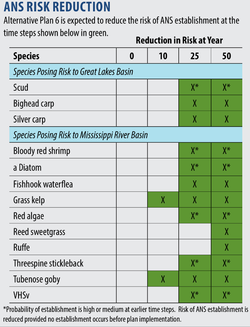 From the GLMRIS report at http://glmris.anl.gov/glmris-report/ From the GLMRIS report at http://glmris.anl.gov/glmris-report/ The U.S. Army Corps of Engineers accepted public comments on its Great Lakes-Mississippi River Interbasin Study (GLMRIS) Report through the month of March. LWV Illinois, LWV Wisconsin and LWV Michigan each submitted letters supporting hydrologic separation to prevent the transfer of invasive species between the Mississippi River watershed and the Lake Michigan watershed. USACE analyzed the expected effectiveness of eight different scenarios that might be used to control the spread of aquatic nuisance species. The analysis is based on the 13 species, listed in the chart at right, that are considered the most risky. The two plans that include permanent barriers between the watersheds are the only ones that are effective against all species, according to the government's analysis. The Leagues' actions were based on their respective Great Lakes Ecosystem positions. |
Archives
December 2017
Categories
All
|

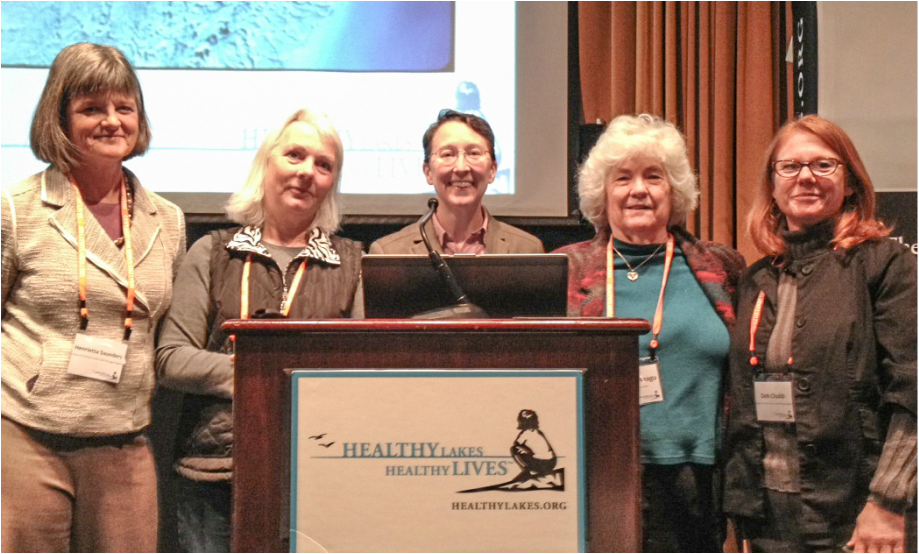
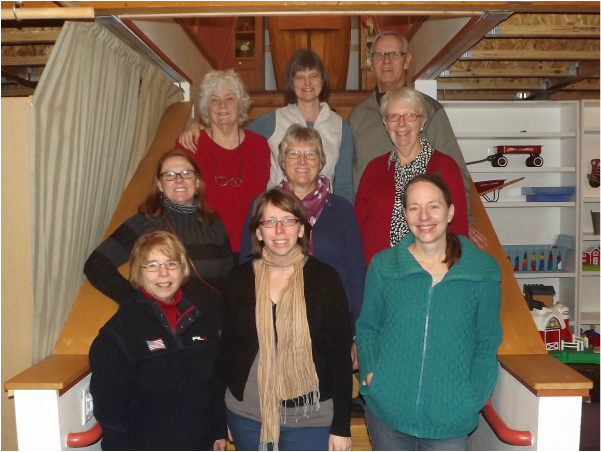
 RSS Feed
RSS Feed